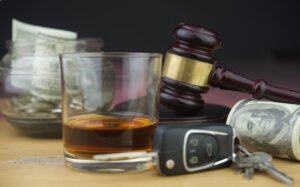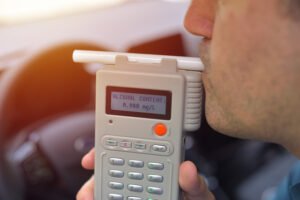
According to Florida law, a Driving Under the Influence (DUI) conviction can remain on a person’s driving record for 75 years. DUI charges also cannot be expunged in Florida. However, with the legal help of a lawyer at The Law Place, you may be able to lessen your DUI charge.
If you have any questions concerning whether it is possible to beat a DUI case, contact The Law Place today for a chance to talk to a DUI defense lawyer. We will happily answer any queries you may have and give you all the legal guidance you may be seeking. To schedule a free consultation, you can call us at (941) 444-4444.

Is It Worth Getting a DUI Lawyer?
A DUI conviction can have incredibly severe ramifications for you if you are found guilty. For example, a DUI case can result in jail time, fines, a loss of your driving license, loss of a job, and losing future employment prospects. This is because a DUI conviction in Florida will stay on your driving record for 75 years, and this damaged record can hinder you massively for the rest of your life.
An experienced and local attorney will be hugely knowledgeable and experienced in the local DUI laws. They will be able to investigate your case to see whether your rights were violated when you got arrested, whether there were any possible witnesses present, and whether the questions were asked correctly by the police. An attorney will be able to thoroughly investigate your DUI case to look for any possible options for defense.
Additionally, if you get an attorney working on your DUI case, you may be able to get your charge of DUI removed or reduced. Your DUI lawyer will advise that you should not plead guilty immediately to the charge so that they have time to investigate and see if your charge can be reduced. You should wait until a DUI defense attorney has properly examined your DUI case and looked for a possible defense.
If you get the legal representation of an attorney, they will know how to represent you in your case of DUI to help to either reduce the charges you face or get them dismissed completely. They can save you a lot of time, help you with the overall costs you may be facing, and, most importantly, save you from having a charge of DUI on your driving record for potentially the rest of your life.

Understanding DUI Laws in Florida
Florida’s DUI laws establish a legal framework designed to deter and penalize driving under the influence. The laws surrounding DUI in Florida are stringent, with clearly defined blood alcohol limits and consequences. For drivers over 21, the legal blood alcohol concentration (BAC) limit is 0.08%. For commercial drivers, the limit is lower at 0.04%, and for drivers under 21, it’s 0.02%. Being aware of these limits is crucial, as exceeding them can lead to a DUI arrest. The law also addresses situations involving probable cause for stopping and testing drivers, which forms a significant part of DUI enforcement. In such cases, understanding the complexities of this legal environment is key to navigating a DUI charge.
 We’re here to serve you. Our phones are open 24 hours a day.
We’re here to serve you. Our phones are open 24 hours a day.
Can a First time DUI be Dismissed?

In the state of Florida, driving under the influence is a majorly serious crime. According to the Florida Department of Highway Safety and Motor Vehicles (FLHSMV), more than 3,000 people suffered severe injuries as the result of alcohol-and-drug related crashes. In 2014, over 40,000 arrests were made for DUI offenders by law enforcement in Florida.
If you are facing a charge of DUI for the first time, and no property was damaged, and no person was hurt, it could be possible to get your charge reduced or dismissed entirely with the help of an experienced attorney.
All cases of DUI differ greatly, and that is why it important to have the advice and representation of an attorney with legal experience as the penalties of which a first-time offender could face does vary. If a police officer stops your vehicle, and you are found to have a blood-alcohol concentration (BAC) of 0.08 percent or higher, you can be charged with DUI.
 We’re Florida’s top litigation team with over 75 years of combined experience
We’re Florida’s top litigation team with over 75 years of combined experience
Consequences of a First-Time DUI Conviction
Some of the penalties that a first-time DUI offender may face- if there is no property damage, no injuries suffered, and no other crimes committed- can include the following:
- A one-year suspension of a driving license.
- Up to $2,000 in fines.
- Six months of jail time, but note that it could be nine months if there was a passenger under the age of 18 in the vehicle or the person’s blood-alcohol concentration measured above 0.15 percent.
In Florida, it is also required for all first-time DUI offenders to face fifty hours of community service as a condition of their probation. Not only this, but most drivers will have their vehicles impounded for ten days after being convicted of DUI.
DUI and Its Impact on Personal Life
A DUI conviction can have far-reaching effects on one’s personal life, extending well beyond the legal consequences. Firstly, the impact on personal relationships can be profound. The stigma associated with a DUI can strain relationships with family, friends, and partners, as it often brings a sense of shame and regret. Additionally, employment opportunities can be significantly hindered by a DUI on your record.
Many employers are hesitant to hire individuals with a criminal record, especially for positions requiring driving. A DUI can result in job loss and make finding new employment challenging, impacting one’s career trajectory and financial stability.
Social stigma is another critical aspect. Individuals with a DUI conviction often face judgment and negative perceptions in their community, which can lead to social isolation and mental health challenges, like depression and anxiety. This stigma can persist long after legal penalties have been served, affecting one’s social life and self-esteem.
The Role of a DUI Lawyer in Your Case
An experienced DUI lawyer plays a pivotal role in the outcome of a DUI case. From negotiating plea deals to challenging the prosecution’s evidence, a good DUI attorney can make a huge difference. DUI lawyers with extensive knowledge of the laws surrounding DUIs are equipped to identify weaknesses in the prosecution’s case, such as the lack of probable cause for a DUI arrest or issues with the breathalyzer test. Their negotiation skills can lead to a more favorable outcome, like reduced charges or even getting a case dismissed.
In some instances, they can arrange a plea deal with lesser penalties, especially in cases of a first offense. The best DUI lawyer for your case is one who has a proven track record in such cases, demonstrating their ability to present evidence effectively and create reasonable doubt during court appearances.
 From the initial call to updates on your case status, we are here to get you answers.
From the initial call to updates on your case status, we are here to get you answers.
Common Misconceptions About DUI Cases
There are several misconceptions about DUI cases that need clarification:
- “If I’m arrested for DUI, I’m automatically guilty.” This is not true. A DUI arrest is not a conviction. Everyone is entitled to a fair trial and the opportunity to defend themselves, and there are various defenses available in DUI cases.
- “Refusing a breathalyzer test means I can avoid a DUI charge.” In Florida, refusing a breathalyzer can lead to automatic license suspension due to implied consent laws. Moreover, refusal can be used as evidence against you in court.
- “A DUI is just a minor offense.” Contrary to this belief, a DUI is a serious criminal offense in Florida with significant legal and personal consequences.
- “Any lawyer can handle a DUI case.” While any licensed attorney can legally represent you, DUI law is complex. An experienced DUI lawyer who understands the nuances of such cases is often needed to achieve the best outcome.
The Importance of Chemical Test Results

In DUI cases, the results of chemical tests, including breathalyzer and blood tests, are crucial. These tests measure the blood alcohol content (BAC) and are pivotal in determining whether someone was legally impaired while driving. However, the accuracy and administration of these tests can be contested:
- Breathalyzer Accuracy – Factors like calibration, the method of administration, and the subject’s medical conditions can affect the accuracy of breathalyzer tests. Experienced DUI lawyers often challenge these tests’ reliability.
- Blood Test Procedures – The way blood samples are collected, stored, and analyzed can also be contested. Issues like contamination or improper handling can lead to inaccurate results.
- Testing Time Frame – The timing of the test in relation to the time of driving is vital. Alcohol levels can rise or fall over time, which means that the BAC at the time of testing might not reflect the BAC at the time of driving.
Due to these factors, chemical test results are often a key focus in DUI defense strategies, where questioning their validity can sometimes lead to lesser penalties or even case dismissals.
What Type of Driving Does Law Enforcement Look for That Suggests DUI?
The police in Florida will look for a certain type of driving that can justify them pulling a vehicle to a stop. They can pull a vehicle to a stop if they suspect that the driver might be under the influence. They might pull a vehicle to a stop if they witness any of the following:
- A vehicle swerving across lanes.
- A vehicle turning with a wide radius.
- A driver looks intoxicated.
- A driver weaves backward and forwards.
- A car is following another too closely.
- A driver slams their brakes unreasonably.
- A car speeds up or slows down too quickly.
- A driver fails to use their headlights at night.
There are multiple more reasons that law enforcement in Florida can use to pull a car to a stop as they may suspect a driver under the influence. It is important to note that if you have been arrested with DUI but believe that your vehicle was pulled to a stop unreasonably, you may be able to get your charge reduced or dropped. An attorney will be able to help you out here by investigating your case, and if they can prove that law enforcement was not justified in stopping your vehicle, you could win your case.
Am I Required to Perform Roadside Field Sobriety Tests?
Although the law in Florida imposes legal ramifications if you refuse to take a blood, breath, or urine test, you are not legally obligated to take any of these roadside sobriety tests. If you refuse these tests, there are no criminal penalties. However, if you refuse one of these tests to check your blood-alcohol, breath alcohol or urine alcohol concentration, a judge may perceive that refusal as a “consciousness of guilt.”
Therefore, we advise that you complete any of the tests asked of you by the law enforcement to help your case. If you perform and behave well whilst being arrested, it can majorly help your attorney prove that you were not actually under the influence. If you feel like you really cannot complete the tests, we suggest that you refuse politely. Your actions and behavior whilst being arrested for DUI can massively impact whether you have a chance of winning your defense case or not.
If you have any further questions concerning field sobriety tests, you can call our law firm, The Law Place, today to seek the advice and guidance of an experienced attorney.
In What Ways Can You Beat DUI Charges?
A DUI defense lawyer may be able to get your DUI charges removed or lessened. Multiple possible defense arguments may apply to your DUI charge. A lawyer may be able to help you beat your DUI charges by being able to prove the following:
- There Was no Probable Cause for the Stop – A police officer in Florida must have a reasonable cause to have stopped your vehicle, detain you, or arrest you for DUI. If a lawyer can prove that an officer did not have a probable cause to do any of those things, your DUI case could be dismissed. For example, this could be the case if you were driving on the road in the early hours of the morning and were stopped by an officer, despite not committing a traffic violation but simply because you were driving after “bar time.” Any possible evidence that the officer would have obtained against you, such as your breath test results and any field sobriety tests, would not be able to get used against you in your DUI case.
- You Were Not Driving – The police officer must prove more than simply you were under the influence but also that you were driving. For example, if a police officer found you in a parked car and charged you with driving under the influence, it would be incredibly difficult for the prosecution to prove that you were driving.
- Police Misconduct – If defense lawyers can prove that there was police misconduct involved in DUI charges, DUI cases can be dismissed. This may also be the case if a person was actually found guilty of DUI. For example, if the DUI police reports were not accurate or the courtroom testimony was not truthful, charges of DUI may be reduced or even dismissed.
- Florida DUI Blood Test Results are not Always Accurate – This could be because your blood test results may have been tainted. For example, there may have been blood contamination, or your blood simply may have been improperly stored.
- Unreliable and Faulty Chemical Tests – The DUI chemical tests used in charges of DUI have many flaws. For example, they can be improperly used by the police and be suffer a malfunction. Breath testing is the most common way for a police officer to test if a person’s blood-alcohol concentration is above the legal limit. However, they are not always accurate as they measure the amount of alcohol present in your breath and not directly a person’s blood-alcohol concentration.
- Medical Conditions -. A person who suffers from a medical condition such as Gastroesophageal Reflux Disease (GERD), heartburn, or acid reflux can contaminate the field sobriety tests used to get a person charged with DUI. This is because these conditions can result in field sobriety tests recording the blood-alcohol concentration of a person, among other things, falsely high.
There are many options your DUI attorney can look into to potentially lessen your charges. This is why having a lawyer on your side if a huge advantage, as they can investigate on your behalf and build a strong case to protect you in court.
Navigating the Legal System Post-DUI Charge
After a DUI charge, the legal process typically involves several stages:
- Arraignment – This is your first court appearance, where you’ll be formally charged and asked to plead guilty, not guilty, or no contest.
- Pre-Trial Motions and Hearings – Your lawyer may file motions (e.g., to suppress evidence) and attend hearings to negotiate with the prosecution.
- Trial – If a plea deal is not reached, the case may go to trial, where evidence is presented, and a judge or jury determines your guilt.
- Sentencing – If found guilty, sentencing will follow. This can include fines, jail time, probation, community service, and other penalties.
Steps to Take Following a DUI Arrest
If you’re arrested for a DUI, take these steps:
- Stay Calm and Cooperate – Be polite and cooperative with law enforcement, but avoid self-incrimination.
- Exercise Your Rights – You have the right to remain silent and the right to an attorney. Use them.
- Document Everything – Write down all details of the arrest as soon as possible.
- Contact a Lawyer – As soon as you can, get in touch with a DUI lawyer.
- Follow Legal Advice – Work closely with your lawyer and follow their advice throughout the legal process.
Can a Lawyer Get You Out of a DUI? FAQ
Can an Experienced DUI Lawyer Guarantee My Case Will Be Dismissed?
No, even the best DUI lawyer cannot guarantee that your DUI case will be dismissed. However, an experienced DUI lawyer can significantly increase the chances of a more favorable outcome. They have extensive knowledge of DUI laws and can often find weaknesses in the prosecution’s case, such as issues with probable cause or the administration of a breathalyzer test.
What Should I Expect at My First Court Appearance for a DUI Charge?
At your first court appearance, known as an arraignment, you will be formally charged and asked to enter a plea (guilty, not guilty, or no contest). A good DUI attorney can guide you through this process and may have already begun negotiations for a plea deal or be planning to present evidence to contest the charges.
Are the Penalties for a First Offense DUI in Florida Severe?
Yes, the penalties for a first offense DUI in Florida can be quite severe. They can include fines, potential jail time, license suspension, and mandatory DUI education programs. The exact penalties will depend on the specifics of your case, such as your blood alcohol content at the time of arrest.
How Can I Challenge a Breathalyzer or Chemical Test Result in My DUI Case?
Challenging a breathalyzer or chemical test result is a common defense strategy in DUI cases. Your DUI lawyer may question the accuracy of the test, the calibration and maintenance of the testing device, or the qualifications of the person administering the test. Other evidence, such as video footage or witness testimony, can also be used to challenge the test results.
What Is the Difference Between a Public Defender and a Private DUI Attorney?
The main difference between a public defender and a private DUI attorney is that a public defender is provided by the state if you cannot afford a private lawyer. While public defenders are competent lawyers, private DUI attorneys often have more time and resources to dedicate to your case, which can make a huge difference in complex DUI cases.
Can Negotiation Skills of a Lawyer Lead to Lesser Penalties in a DUI Case?
Yes, one of the key benefits of hiring a skilled DUI lawyer is their negotiation skills. An experienced attorney can negotiate with prosecutors to potentially reduce your charges or the severity of your penalties, sometimes achieving outcomes like reduced fines or alternative sentencing.
What Should I Do Immediately After a DUI Arrest?
Immediately after a DUI arrest, it is crucial to remain calm and exercise your right to remain silent. Politely decline to discuss the details of your case without an attorney present. As soon as possible, contact a good DUI attorney to discuss your case and plan your defense. Remember, the steps you take immediately following your arrest can have a significant impact on the outcome of your case.
How Does a DUI Conviction Affect Future Employment Opportunities?
A DUI conviction can significantly affect future employment opportunities. Many employers conduct criminal background checks, and a DUI conviction can be seen as a mark of irresponsibility. This is particularly true for jobs that involve driving or high levels of trust and security.
What Are the Long-Term Consequences of Having a DUI on My Criminal Record?
The long-term consequences of having a DUI on your criminal record include increased insurance rates, potential job loss, difficulty in obtaining certain professional licenses, and social stigma. In Florida, a DUI stays on your criminal record for 75 years, making it almost a lifelong mark.
Call The Law Place Today
DUI convictions can have very serious consequences such a driving license suspension and large fines and remain on your record for almost your whole lifetime. We, therefore, recommend that if you have been arrested with DUI charges that you seek the legal advice of a DUI attorney as quickly as possible. A lawyer at The Law Place in Florida will be experienced in dealing with DUI cases, and they will be able to present to you the best legal options available to you.
If you have any further questions or queries concerning how it is possible to get charges of DUI reduced or lessened, contact The Law Place today. One of our defense attorneys will be able to answer any questions you may be seeking. We can offer you a free consultation, of which we will be able to discuss your case with you and present to you your possible legal options. Don’t hesitate to contact us today if you are facing a DUI charge. The Law Place strives to achieve the best for our clients. We are available 24 hours a day, seven days a week. Call us today at (941) 444-4444.

